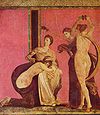Mars (mythology)

|
Ancient Roman Religion |
|
| Main doctrines | |
| Polytheism & Numen Mythology Imperial Cult · Festivals |
|
| Practices | |
|
Temples · Funerals |
|
|
Ceres · Diana · Juno |
|
| Texts | |
| Sibylline Books · Sibylline oracles Aeneid · Metamorphoses The Golden Ass |
|
| See also: | |
| Persecution · Nova Roma Greek polytheism |
Mars was the Roman warrior god, the son of Juno and Jupiter, husband of Bellona, and the lover of Venus. He was the most prominent of the military gods that were worshipped by the Roman legions. The martial Romans considered him second in importance only to Jupiter. His festivals were held in March (named for him) and October.
As the word Mars has no Indo-European derivation, it is most likely the Latinised form of the agricultural Etruscan god Maris. Initially the Roman god of fertility and vegetation and a protector of cattle, fields and boundaries, Mars later became associated with battle as the growing Roman Empire began to expand, and he was identified with the Greek god Ares. Unlike his Greek counterpart, Mars was generally well revered and rivaled Jupiter as the most honoured god. He was also the tutelary god of the city of Rome. As he was regarded as the legendary father of Rome's founder, Romulus, it was believed that all Romans were descendants of Mars.
Contents |
Names and epithets

Mars was called Mavōrs in some poetry (Virgil VIII, 630), and Mamers was his Oscan name. He was also known as Marmor, Marmar and Maris, the latter from the Etruscan deity Maris.
Like other major Roman deities, Mars had a large number of epithets representing his different roles and aspects. Many of Mars's epithets resulted from mythological syncretism between Mars and foreign gods. The most common and significant of these included:
- Mars Alator, a fusion of Mars with the Celtic deity Alator (possibly meaning "Huntsman" or "Cherisher"), known from inscription found in England, on an altar at South Shields and a silver-gilt votive plaque at Barkway, Hertfordshire. [1][2]
- Mars Albiorix, a fusion of Mars with the ancient Celtic deity Toutatis, using the epithet Albiorix ("King of the World"). Mars Albiorix was worshiped as protector of the Albici tribe of southern France, and was regarded as a mountain god. Another epithet of Toutatis, Caturix ("King of Combat"), was used in the combination Mars Caturix, which was worshipped in Gaul, possibly as the tribal god of the Caturiges.[3]
- Mars Balearicus, statues of a warrior discovered in the Mallorca Island, associated by the archaeologists to the Roman god Mars [1].
- Mars Barrex, from Barrex or Barrecis (probably meaning "Supreme One"), a Celtic god known only from a dedicatory inscription found at Carlisle, England.[2]
- Mars Belatucadrus, an epithet found in five inscriptions in the area of Hadrian's Wall in England, based on equating the Celtic deity Belatu-Cadros with Mars.
- Mars Braciaca, a synthesis of Mars with the Celtic god Braciaca. This deity is only known from a single inscription at Bakewell, England.[2]
- Mars Camulos, from the Celtic war god Camulus.
- Mars Capriociegus, from an Iberian god who was linked to Mars. He is invoked in two inscriptions in the Pontevedra region of north-west Spain.
- Mars Cocidius, a combination of Mars with the Celtic woodland hunting god Cocidius. He is referenced around north-west Cumbria and Hadrian's Wall, and was chiefly a war god only in instances where he was equated with Mars.
- Mars Condatis, from the Celtic god of the confluence of rivers, Condatis. Mars Condatis, who oversaw water and healing, is known from inscriptions near Hadrian's Wall, at Piercebridge, Bowes and Chester-le-Street.[2][4]
- Mars Corotiacus. A local British version of Mars from Martlesham in Suffolk. He appears on a bronze statuette as a cavalryman, armed and riding a horse which tramples a prostrate enemy beneath its hooves. [3]
- Mars Gradivus, God of War.
- Mars Lenus. A fusion of Mars with the Celtic healer-god Lenus. In the main cult centre of the god, the indigenous name always comes first (Lenus Mars), an indication that Lenus was an established god, with whom Mars was later equated. [3]
- Mars Loucetius. A fusion of Mars with the Celtic god Loucetius.
- Mars Mullo. A fusion of Mars with the Celtic god Mullo
- Mars Nodens. A fusion of Mars with the Celtic god Nodens.
- Mars Ocelus. A fusion of Mars with the Celtic god Ocelus.
- Mars Olloudius. A fusion of Mars with the Celtic god Olloudius.
- Mars Rigisamus. Mars was given this title (which means 'Greatest King' or 'King of Kings') in at West Coker in Somerset, where a bronze figurine and inscribed plaque dedicated to the god were found in a field, along with the remains of a building, perhaps a shrine. The figurine depicts a standing naked male figure with a close-fitting helmet; his right hand may have once held a weapon, and he probably originally also had a shield (both are now lost). The same epithet for a god is recorded from Bourges in Gaul. The use of this epithet implies that Mars had an extremely high status, over and above his warrior function.
- Mars Rigonemetis ("King of the Sacred Grove"). A dedication to Rigonemetis and the numen (spirit) of the Emperor inscribed on a stone was discovered at Nettleham (Lincolnshire) in 1961. Rigonemetis is only known from this site, and it seems he may have been a god belonging to the tribe of the Corieltauvi. [3]
- Mars Segomo. A fusion of Mars with the Celtic god Segomo.
- Mars Teutates. A fusion of Mars with the Celtic god Teutates (Toutatis).
- Mars Thinesus. A form of Mars invoked at Homesteads at Hadrian's Wall, where his name is linked with two goddesses called the Alaisiagae. Anne Ross associated Thinesus with a sculpture, also from the fort, which shows a god flanked by goddesses and accompanied by a goose - a frequent companion of war gods. [3]
- Mars Ultor Under Augustus he obtained this title, meaning Avenger, in recognition of his victory over Caesar's assassins.
- Mars Visucius. A fusion of Mars with the Celtic god Visucius.
- Mars Vorocius. A Celtic healer-god invoked at the curative spring shrine at Vichy (Allier) as a curer of eye afflictions. On images, the god is depicted as a Celtic warrior. [3]
Notes
- The Latin declension of the Name is
| Nominative | Mar | –s |
|---|---|---|
| Genitive | Mar | –tis |
| Dative | Mar | –ti |
| Accusative | Mar | –tem |
| Vocative | Mar | –s |
| Ablative | Mar | –te |
The name's word stem is therefore "Mart-", hence the adjective martian (martianus).
- The name Mars survives in everyday use in reference to military or extraordinary circumstances, such as martial arts or martial law.
- The common forename or surname Martin (also spelt Martyn, Martijn and Marten, amongst other ways, in different languages) derives from Mars with the meaning dedicated to Mars or man of Mars.
- The third day of the week in Roman times was dedicated to Mars: Martis Dies (Tuesday, literally Mars' Day). It has survived in the Romanic languages as Martes (Spanish), Mardi (French), Martedi (Italian), Marţi (Romanian), An Mháirt (Irish/Gaelic), Mawrth (Welsh), Dimarts (Catalan).
- In the Thai solar calendar, Tuesday is named for Mars from a Pali word that also means "Ashes of the Dead".[[2]] The colour associated with the day is Scarlet.
- In many languages Tuesday is named for the planet Mars or the God of War: See Days of the Week Planetary table.
Also known as the marsmon named after him
- The month of March is inspired by this god's name.
Photo gallery
See also
References
- ↑ Phillips, E.J. (1977). Corpus Signorum Imperii Romani, Great Britain, Volume I, Fascicule 1. Hadrian's Wall East of the North Tyne (p. 66). Oxford: Oxford University Press. ISBN 0-19-725954-5.
- ↑ 2.0 2.1 2.2 2.3 Ross, Anne (1967). Pagan Celtic Britain. Routledge & Kegan Paul. ISBN 0-902357-03-4.
- ↑ 3.0 3.1 3.2 3.3 3.4 3.5 Miranda J. Green. "Dictionary of Celtic Myth and Legend" (p. 142.) Thames and Hudson Ltd. 1997
- ↑ Jones, Barri & Mattingly, David (1990). An Atlas of Roman Britain (p. 275). Oxford: Basil Blackwell. ISBN 1-84217-067-8.
pt:Marte (mitologia)]]
